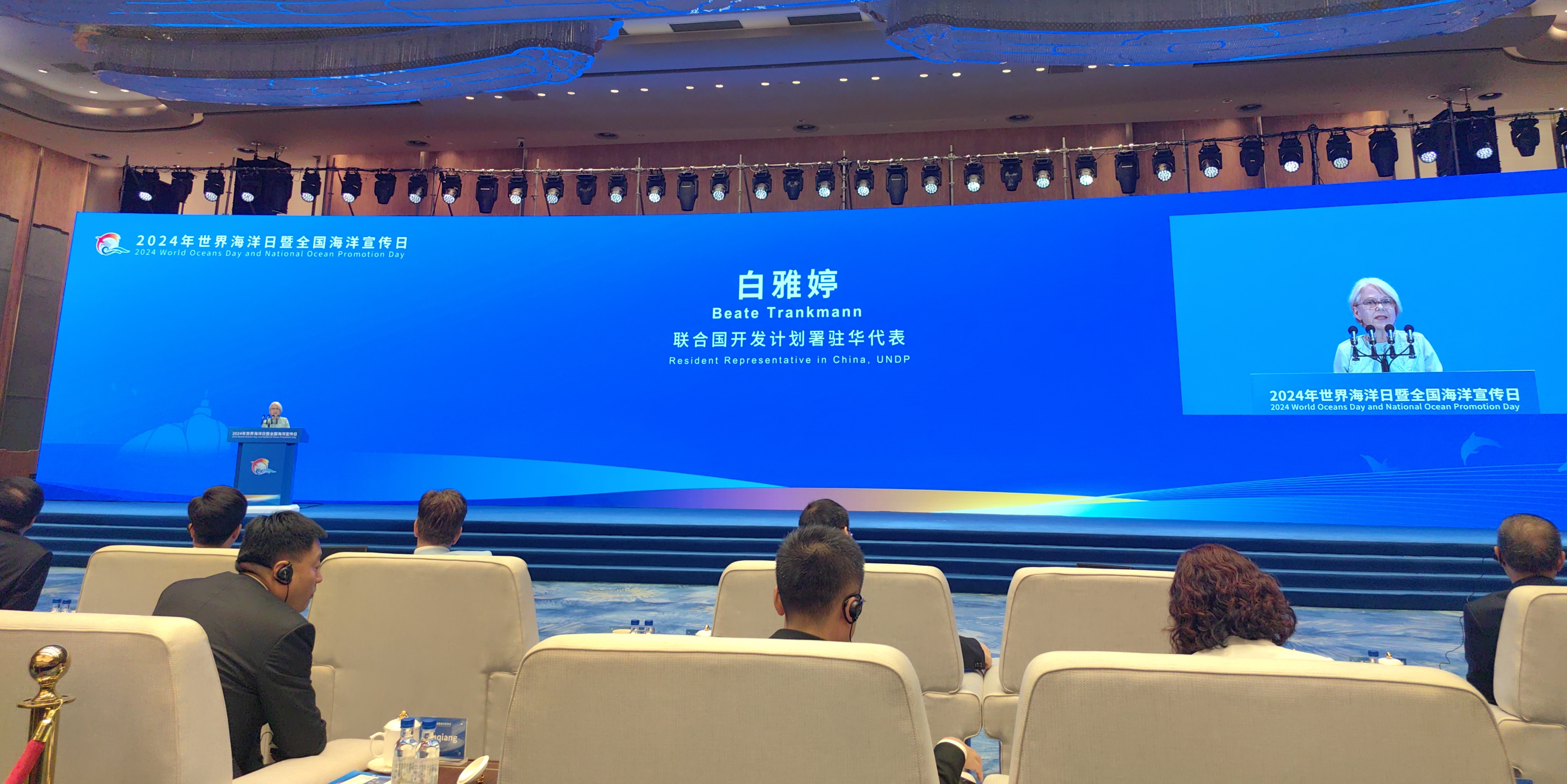Opening Remarks by Ms. Beate Trankmann at the 2024 World Oceans Day Event
June 8, 2024

UNDP Resident Representative in China, Beate Trankmann, delivered opening remarks at the 2024 World Oceans Day Event in Xiamen, Fujian Province.
尊敬的孙副部长,
王副主任,
林副省长,
General Secretary of the Ministry of Environment and Energy of Greece
各位来宾 - 早上好
我很荣幸代表联合国开发计划署来到美丽的厦门参加2024世界海洋日活动!
(On behalf of the UN Development Programme, it is my pleasure to join you this morning in beautiful Xiamen for the 2024 World Oceans Day!)
Let me start by thanking our hosts for the hospitality. We had a great afternoon yesterday witnessing Xiamen’s impressive nature restoration efforts & I can’t think of a better place to host this event.
Oceans cover 70% of the Earth’s surface, and are home to as much as 80% of all life on the planet.
However, as we gather here today, the health and sustainability of marine and coastal environments are at serious risk, along with the billions of people whose lives depend on them.
Our oceans face an urgent crisis driven by overfishing, pollution and climate change. Around 35% of fish stocks are over-exploited and around 10 million tons of plastic enter the ocean each year.
Protection of the oceans is critical to maintaining the delicate balance of global ecosystems, impacting the future of all living things on our planet – including humanity.
Yet despite this, SDG 14 – life below water – is estimated to receive the lowest investment of all the 17 Sustainable Development Goals.[1]
The theme of World Oceans Day this year is “awaken new depths” because we cannot address this global emergency with efforts that only “skim the surface”.
We need to raise ambition levels, strengthen our commitments, and urgently accelerate action.
"The vast oceans that make our planet the Blue Planet are far too large for any one country to protect single-handedly. It is the responsibility of all – from governments to individuals – to safeguard these immense, yet fragile bodies of water."
Let me highlight a few areas in particular, where attention is needed:
First, since nature does not have geographic boundaries, we must adopt more integrated approaches to protecting oceans. Strengthened cooperation between different sectors & regions to coordinate conservation efforts across both land and sea is vital to maximize impact.
Second, climate and biodiversity are mutually dependent. The ecosystems, which climate change is destroying provide habitats for wildlife, and absorb greenhouse gases as carbon sinks. Oceans absorb 25% of all CO2 emissions and capture 90% of the excess heat that these emissions generate.[2] It is therefore key that we tackle the challenges of climate change and eco-conservation together.
Third, plastic pollution must be addressed. Currently, plastic makes up 80% of ocean debris and affects 88% of marine species. By 2040, there will be 700 million tons of plastic in the ocean—equal to the weight of all the fish combined.[3] Comprehensive solutions are needed urgently that don’t just help clean up our oceans, but reduce the production of plastics in the first place.
Lastly, we must embrace the concept of the “blue economy”. The preservation of our oceans shouldn’t be seen as coming at the cost of economic growth. On the contrary, ocean resources already account for 7% of global GDP,[4] while declining ocean health will cost the global economy US$428 billion per year by 2050[5].
At UNDP, through our global Ocean Promise, we are committed to helping countries accelerate progress on SDG14, including China, where we have made important progress together with partners. For instance, with the support of the Global Environment Facility (GEF) and co-financing by China, our Marine Protected Area project helped to increase the population of the endangered Chinese White Dolphins in the northern Gulf of Qinzhou.
Here in Xiamen, UNDP has been a co-sponsor of World Oceanic Week since 2005, alongside the Ministry of Natural Resources and Xiamen Municipal Government.
I want to express my appreciation to the Ministry of Natural Resources for the partnership over the years and look forward to continue building on them in future.
In closing, let me reemphasize – the vast oceans that make our planet the Blue Planet are far too large for any one country to protect single-handedly.
It is the responsibility of all – from governments to individuals – to safeguard these immense, yet fragile bodies of water.
The future of life, in all forms, depends on it.
Happy World Oceans Day! 世界海洋日快乐!Thank you! 谢谢大家!
[1] https://www.undp.org/press-releases/ocean-and-blue-economy-are-fundamental-addressing-triple-planetary-crisis-says-undp
[2] https://www.un.org/en/climatechange/science/climate-issues/ocean
[3] https://www.undp.org/chemicals-waste/plastic-pollution
[4] https://ec.europa.eu/maritimeaffairs/sites/maritimeaffairs/files/2020_06_ blueeconomy-2020-ld_final.pdf
[5] https://www.ipcc.ch/srocc/

 Locations
Locations